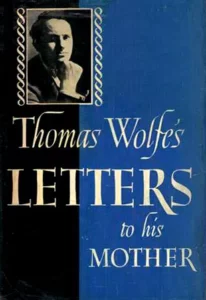Thomas Wolfe on Ambition, Gratitude, and the True Measure of Success, in Letters to His Mother
INSPIRATIONAL, 18 Oct 2021
Maria Popova | Brain Pickings – TRANSCEND Media Service
“It is not all bad, but it is not all good, it is not all ugly, but it is not all beautiful, it is life, life, life — the only thing that matters.”
 “Does what goes on inside show on the outside?” Van Gogh wrote to his brother in contemplating how ambition is transmuted into art, adding wistfully: “Someone has a great fire in his soul and nobody ever comes to warm themselves at it, and passers-by see nothing but a little smoke at the top of the chimney and then go on their way. So now what are we to do, keep this fire alive inside, have salt in ourselves, wait patiently…”
“Does what goes on inside show on the outside?” Van Gogh wrote to his brother in contemplating how ambition is transmuted into art, adding wistfully: “Someone has a great fire in his soul and nobody ever comes to warm themselves at it, and passers-by see nothing but a little smoke at the top of the chimney and then go on their way. So now what are we to do, keep this fire alive inside, have salt in ourselves, wait patiently…”
Most artists are driven by this fuming disconnect between their interior fire and its exterior smoke, but few have confronted it with more blazing a refusal to be patient than the great novelist and dramatist Thomas Wolfe (October 3, 1900–September 15, 1938), who channeled his fiery ambition with extraordinary eloquence and intensity in the correspondence collected in the out-of-print gem Thomas Wolfe’s Letters to His Mother (public library) — the closest thing we have to a record of the creative credo animating one of the twentieth century’s greatest writers.
Wolfe was very much a craftsman of his own destiny — his father was a gravestone carver, his mother operated a boarding house, and he was the youngest of their eight children. He entered college when he was only fifteen and was admitted into Harvard’s Graduate School of Arts and Sciences at nineteen. In a letter from mid-May of 1921, as he was completing his first semester of graduate studies at Harvard, twenty-year-old Wolfe writes to his mother:
I’ve put a heavy burden on myself; the burden of vindicating your generosity. If I fail you need never expect me home. You’ll never hear from me again. If I succeed, and it is on that I love to think, I will be able to return and afford you, I hope, a certain measure of satisfaction and pride. Meanwhile, whatever taunts may be thrown at me, if any, of selfishness, pride, conceit, snobbishness, or what not, strike against as tough a hide as a sensitive fellow can call to his defense.
I tell you, if success depends on desperate determination I will not fail. I think if the realization ever came to me that I was doomed to eternal failure, that “my bright sun” would always be just out of reach — I think I would kill myself… Of one thing I earnestly entreat you never to doubt: That is the sense of gratitude and loyalty I feel to you and Papa… When I retire at night, when I wake in the morning I am conscious of the weight of my gratitude; it is the spur that drives me on.

Shortly after Wolfe received his master’s degree from Harvard the following year, his father died — an event that devastated him and deeply imprinted his identity as a writer. To pull himself from under the weight of grief, he reached for the heights of creative self-actualization with ever-greater ambition and determination. In a letter from March of 1923, he writes to his mother:
I feel the sap rising in me, I cannot with all humility, help but feel that the thing is bound to come, and come with a rush when it does.
Two months lather, Wolfe’s ambition erupts:
I know this now: I am inevitable. I sincerely believe the only thing that can stop me now is insanity, disease, or death. The plays I am going to write may not be suited to the tender bellies of old maids, sweet young girls, or Baptist Ministers but they will be true and honest and courageous, and the rest doesn’t matter. If my play goes on I want you to be prepared for execrations upon my head. I have stepped on toes right and left… I am not interested in writing what our pot-bellied members of the Rotary and Kiwanis call a “good show” — I want to know life and understand it and interpret it without fear or favor. This, I feel is a man’s work and worthy of a man’s dignity. For life is not made up of sugary, sticky, sickening Edgar A. Guest sentimentality, it is not made up of dishonest optimism, God is not always in his Heaven, all is not always right with the world. It is not all bad, but it is not all good, it is not all ugly, but it is not all beautiful, it is life, life, life — the only thing that matters. It is savage, cruel, kind, noble, passionate, selfish, generous, stupid, ugly, beautiful, painful, joyous — it is all these, and more, and it’s all these I want to know and, by God, I shall, though they crucify me for it. I will go to the ends of the earth to find it, to understand it … and I will put it on paper, and make it true and beautiful.
But Wolfe, a staunch idealist who despised how commercialism hijacks beauty from truth, adds a piercing caveat:
When I speak of beauty I do not mean a movie close-up where Susie and Johnnie meet at the end and clinch and all the gum-chewing ladies go home thinking husband is not so good a lover as Valentino. That’s cheap and vulgar. I mean everything which is lovely, and noble, and true. It does not have to be sweet, it may be bitter, it does not have to be joyous, it may be sad.
[…]
I know there is nothing so commonplace, so dull, that it is not touched with nobility and dignity. And I intend to wreak out my soul on paper and express it all. That is what my life means to me: I am at the mercy of this thing and I will do it or die.
In a sentiment strikingly similar to young Sylvia Plath’s exaltation at the raw material of writing, Wolfe adds:
This is why I think I’m going to be an artist. The things that really mattered sunk in and left their mark. Sometimes only a word — sometimes a peculiar smile — sometimes death — sometimes the smell of dandelions in Spring — once Love. Most people have little more mind than brutes: they live from day to day. I will go everywhere and see everything. I will meet all the people I can. I will think all the thoughts, feel all the emotion I am able, and I will write, write, write.
In another letter to his mother from July of the following year, Wolfe revisits the sense of gratitude driving his art:
Life teaches us. Nothing endures. Nothing lasts except beauty — and I shall create that… I shall never forget, or be lacking in gratitude for what you have done for me — but I shall repay that some day. I shall be great — if I do not die too soon — and you will be known as my mother. I say that seriously — I believe it. There is no one like me, and I shall conquer. Fools will call this conceit, but let them say what they will — they are fools.
A little more than a year later, Wolfe began writing what would become Look Homeward, Angel — his autobiographical debut novel, the 1929 publication of which catapulted him into literary celebrity. He wasn’t yet thirty. Nine years later, complications from pneumonia took his life two weeks before his thirty-eight birthday. The day after his funeral, The New York Times wrote:
There was within him an unspent energy, an untiring force, an unappeasable hunger for life and for expression which might have carried him to the heights and might equally have torn him down.
Thomas Wolfe’s Letters to His Mother is an electrifying read in its entirety, brimming with precisely this “unappeasable hunger for life and for expression” that Wolfe channeled into his work and his ideas on art, literature, and life. Complement this particular portion with Georgia O’Keeffe’s magnificent letter to Sherwood Anderson on what success really means and David Foster Wallace on the double-edged sword of ambition.
_______________________________________
 Brain Pickings is the brain child of Maria Popova, an interestingness hunter-gatherer and curious mind at large obsessed with combinatorial creativity who also writes for Wired UK and The Atlantic, among others, and is an MIT Futures of Entertainment Fellow. She has gotten occasional help from a handful of guest contributors. Email: brainpicker@brainpickings.org
Brain Pickings is the brain child of Maria Popova, an interestingness hunter-gatherer and curious mind at large obsessed with combinatorial creativity who also writes for Wired UK and The Atlantic, among others, and is an MIT Futures of Entertainment Fellow. She has gotten occasional help from a handful of guest contributors. Email: brainpicker@brainpickings.org
Go to Original – brainpickings.org
Tags: Inspirational
DISCLAIMER: The statements, views and opinions expressed in pieces republished here are solely those of the authors and do not necessarily represent those of TMS. In accordance with title 17 U.S.C. section 107, this material is distributed without profit to those who have expressed a prior interest in receiving the included information for research and educational purposes. TMS has no affiliation whatsoever with the originator of this article nor is TMS endorsed or sponsored by the originator. “GO TO ORIGINAL” links are provided as a convenience to our readers and allow for verification of authenticity. However, as originating pages are often updated by their originating host sites, the versions posted may not match the versions our readers view when clicking the “GO TO ORIGINAL” links. This site contains copyrighted material the use of which has not always been specifically authorized by the copyright owner. We are making such material available in our efforts to advance understanding of environmental, political, human rights, economic, democracy, scientific, and social justice issues, etc. We believe this constitutes a ‘fair use’ of any such copyrighted material as provided for in section 107 of the US Copyright Law. In accordance with Title 17 U.S.C. Section 107, the material on this site is distributed without profit to those who have expressed a prior interest in receiving the included information for research and educational purposes. For more information go to: http://www.law.cornell.edu/uscode/17/107.shtml. If you wish to use copyrighted material from this site for purposes of your own that go beyond ‘fair use’, you must obtain permission from the copyright owner.
